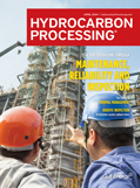Pérez, E.
FCC catalyst deactivation studies to mimic refinery conditions for high-propylene applications
Environment & Safety
/ Petrochemicals
/ Process Optimization
/ Refining
/ Catalysts
/ Distillation
/ Economics
/ Engineering & Design
/ Environment
/ Equipment
/ Europe
The fluid catalytic cracking unit (FCCU) is a conversion unit located at the heart of many refineries. Its main purpose is to crack crude oil-derived feedstocks into valuable liquid products, primarily LPGs (propylene and butylenes), and gasoline and light-cycle oil (LCO) precursors. The process uses a fluidizable catalyst, comprising an alumina-silica framework and tailored for each refinery to meet its specific needs. Often, the changing of a catalyst includes catalyst testing evaluations, employed by about 50% of the FCCUs in the world. The testing process is cumbersome, in which multiple methods are available to refineries.
- 1
- ... 1 pages
Current Digital Edition

Sign up to Receive Our Newsletter
Latest News
- Holland America starts pilot tests using renewable fuels on cruise liner 5/3
- U.S. admin sets path for ethanol aviation fuel subsidies 5/3
- Ryazan refinery (Russia) hit by drone strike 5/3
- Novatek's new Ust-Luga condensate unit set for June testing 5/3
- Thiozen pilot successfully produces zero-emission H2 from sour gas waste streams 5/3
- Mexico's Pemex exported 20,000 bpd of crude, fuel to Cuba in H2 2023 5/3
Construction Boxscore: Project Spotlight
Project:
Long Son Petrochemicals Complex
Location:
Long Son, Vietnam
Operator:
Siam Cement Group
Cost:
$5.4 B
Capacity:
1.65 MMtpy
Completion date:
2023
Status:
Under Construction




